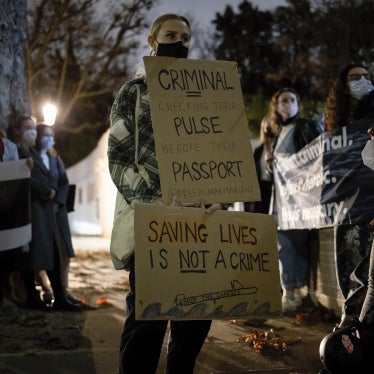The Italian government’s targeting of Romanians, and particularly those of Roma origin, for expulsion violates Italy’s international human rights obligations, Human Rights Watch said today.
On October 31, the Italian government adopted an emergency decree for the immediate expulsion of citizens of other European Union countries. The decree followed a brutal crime allegedly committed by a Roma man from Romania (an EU member since January). The temporary decree, which came into force on November 2, needs parliamentary confirmation within 60 days.
“Romanians are the real target of this expulsion decree, not EU nationals in general,”said Judith Sunderland, EU researcher at Human Rights Watch. “The Italian authorities should not punish a community for the alleged crimes of one member. Parliament should move quickly to ensure in-country appeals against these rapid expulsions.”
The move comes amid a wave of police action and public violence in Italy targeting Romanians, particularly those of Roma origin. In the days following the October 30 robbery and murder of an Italian woman, Giovanna Reggiani, in Rome, authorities forcibly evacuated and bulldozed the Roma camp where the alleged murderer, a Romanian Roma man, was living. Police have conducted similar raids on Roma camps in Bologna, Florence and Genoa.
On November 2, a group of hooded men armed with metal bars and knives attacked a crowd of Romanians in the parking lot of a supermarket in Rome. Three men remain in hospital as a result of their injuries. On the night of November 4, a bomb exploded outside a Romanian-owned store in a town just outside Rome, causing property damage. Last weekend, a Romanian football player was subjected to racist taunts during a match.
Interior Minister Giuliano Amato has justified the emergency decree as an attempt to “prevent the terrible tiger of xenophobia, the racist beast, from breaking out of the cage.” Four Roma men were expelled to Romania on November 2, the day the decree entered into effect. Since then, prefects in Rome, Turin, Genoa and Milan have issued expulsion orders for at least 24 other Romanians.
“If the government is serious about curbing xenophobia, it needs to lead by example,” said Sunderland. “Police raids and expulsions send the message that discriminating against Roma and Romanians is OK.”
The Italian government’s temporary decree gives local prefects the authority to expel EU citizens considered a threat to public order, even in the absence of a criminal investigation. The order must be approved by a local justice of the peace within 48 hours.
Although the decree covers citizens of any EU member state, the political debate and official action has focused exclusively on Romanians, and in particular Roma from that country. Romanians are now largest immigrant group in Italy, estimated at around 560,000 people, or 1 percent of the general population. An estimated 50,000 of these are Roma.
The decree allows for expulsions for “imperative reasons of public safety,” which are vaguely defined as “behavior that compromises the protection of human dignity or fundamental human rights or of public safety.” These expulsions can be enforced virtually immediately, and there is no right to an in-country appeal. Those expelled can be denied the right to return to Italy for up to three years, and prohibited re-entry is punishable by up to three years in prison.
Romanian Prime Minister Calin Popescu Tariceanu has said he plans to introduce legislation to deny Romanians expelled from other countries the right to travel outside the country for a period of time.
Discrimination against Roma is not a new phenomenon in Italy. A group of Roma families from Bosnia sued Italy in the European Court of Human Rights after they were evacuated from their camp outside Rome and expelled to Sarajevo in March 2000. The Italian government agreed to a friendly settlement in 2004, allowing the families to return to Italy and paying financial compensation. Collective expulsion is prohibited under the European Convention on Human Rights, and the Charter of Fundamental Rights of the European Union.
Italy has also been criticized for the lack of safeguards in national security expulsion cases. The previous government adopted an emergency decree in July 2005 creating a fast-track expulsion procedure for terrorism suspects that explicitly denies a national security suspect the right to remain in Italy while an appeal is pending. Last May, the UN Committee Against Torture expressed concern about “the immediate enforcement of these expulsion orders, without any judicial review,” and stated that the procedure “lacks effective protection” against returns to risk of torture.








